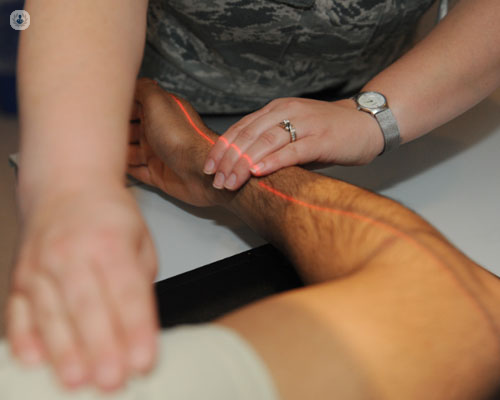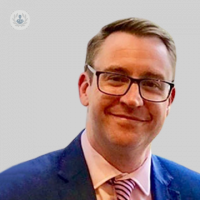How are tennis and golfer's elbow treated?
Written by:Find out all about the treatment options for both tennis elbow and golfer’s elbow in this article below, as esteemed consultant orthopaedic surgeon, Mr Dave Cloke, explains all.

What are the causes and symptoms of tennis elbow and golfer's elbow, and how can they be distinguished?
It is probably best thought that there is a process of wear and tear in the tendons around the elbow which results in pain in both conditions. This can be short-lived or can last for a prolonged period of time but, ultimately, we do know that it gets better eventually. The condition on the outer side of the elbow is known as tennis elbow, and on the inner side is known as golfer’s elbow.
Are there non-surgical treatment options available for tennis and golfer's elbow, and how effective are they?
There are a wide variety of treatments with varying degrees of evidence. Recently, the British Elbow and Shoulder Society produced guidelines for the management of these problems. It has to be borne in mind that we know that the condition will settle in 50 per cent of people within any three-month period.
Therefore, the chances of having ongoing symptoms become less and less overtime. Unfortunately, many treatments are not based on any evidence. However, physiotherapy can be very helpful when it comes to improving strength in the elbow.
Surgery can be helpful in those people with symptoms going on for prolonged periods of time. One thing is clear – steroid injection treatment, whilst it may improve symptoms temporarily, might actually lead to more prolonged symptoms in the long term, so it is best avoided.
When is surgery recommended for tennis or golfer's elbow, and what does the procedure involve?
Surgery may be offered as an option for patients who have prolonged symptoms have not responded to other treatments. It is an offer, rather than a recommendation. Generally speaking, it may be a good option for people who have failed to improve with all other treatments over a period of at least a year.
However, again, we know that 50 percent of people with symptoms will get better in any three-month period. Therefore, 75 percent within six months and so on. Therefore, you are potentially having an operation when you may well get better anyway and there are always risks of an operation, equally it may not work, and it may well take a good couple of months or so to get better. This is a decision to be weighed up by the patient.
Can physical therapy and exercises help alleviate symptoms of tennis or golfer's elbow, and what does a rehabilitation plan typically look like?
Certainly. Physiotherapy can greatly help with symptom management, and also may shorten the course of the problem. Typical therapies include the use of gentle exercises to strengthen the tendons that affected.
Are there lifestyle modifications or preventive measures to reduce the risk of developing tennis or golfer's elbow?
Unfortunately, as with most of these issues, this is probably a largely genetic problem that some people are just going to get. It may relate to overactivity but more commonly occurs in people with no particular risk factors.
To book an appointment with Mr Dave Cloke, you can do just that by visiting his Top Doctors profile today.


